The Da Vinci robot-assisted surgical system has arrived at the University of Debrecen Clinical Centre. The 21st-century, state-of-the-art technology is used primarily in general surgery, as well as surgical procedures in urology, gynaecology and otolaryngology. Thanks to the precise and safe surgical techniques made possible by it, the risk of complications is reduced and recovery times are shortened. The investment of more than one billion Hungarian forints in robotic surgery was officially introduced at the institution on Tuesday.
News

Participants in an international training program (GESEA: Gynecological Endoscopic Surgery Education and Assessment), which started on Thursday at the University of Debrecen's Institute of Obstetrics and Gynecology, can improve their skills in gynecological endoscopic procedures. In the course, which is unique in Hungary, specialists and would-be specialists get a chance to conduct their practices in a dry laboratory that was recently renovated with the support of the Faculty of Medicine out of a budget of around HUF 40 million.

The refurbished premises of the Clinical Physiology Department of the University of Debrecen Clinical Centre, Cardiology and Cardiac Surgery Clinic, have been opened. The development has further improved the conditions for teaching and research closely related to clinical patient care at the institution.
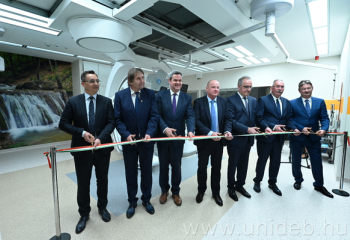
On Monday, a hybrid operating theatre opened at the Department of Cardiology and Cardiac Surgery of the University of Debrecen, where mainly special cardiac catheter interventions are performed, but it is also suitable for open heart surgery. The state-of-the-art operating theatre was built with a budget of around one billion forints.
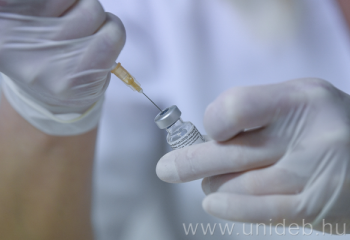
Antibiotic-resistant bacteria and novel therapeutic options were discussed at the recent international online conference on Infectious Diseases in a One Health context. Organized by the One Health Institute of the Faculty of Health Sciences, the Faculty of Agricultural and Food Sciences and Environmental Management, the Institute of Metagenomics of the University of Debrecen, the Veterinary Medical Research Institute and the Centre for Ecological Research of the Hungarian Research Network, the objective of the event was to promote discussion and knowledge exchange.
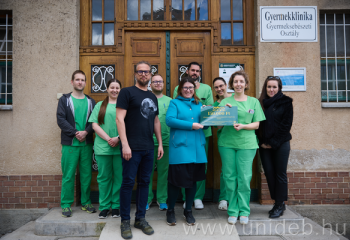
DOTE Foundation for Pediatric Surgery will use the donations collected at the so-called wardrobe fairs held earlier this year to purchase medical equipment. The amount of the donation, worth HUF 150,000, was handed over by representatives of the organizers, Debrecen Reformed University Congregation and the University of Debrecen Talent Development Program (Debreceni Egyetem Tehetséggondozó Program -DETEP) at a “house-party” ceremony held in the Pediatric Surgery Pavilion on Monday.
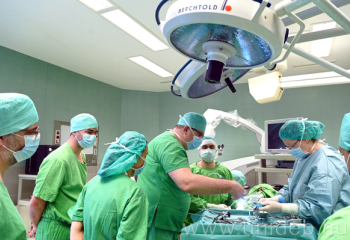
Several new surgical techniques have been introduced in recent months at the University of Debrecen Clinical Centre for Otolaryngology and Head and Neck Surgery. The use of state-of-the-art procedures allows patients to continue their daily activities and work with the best possible quality of life.
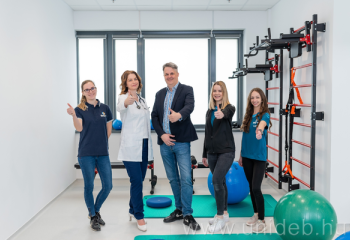
Sports Diagnostics, Lifestyle and Therapy Center of the University of Debrecen (Debreceni Egyetem Sportdiagnosztikai, Életmód és Terápiás Központja – SET) has received a major recognition after the recent opening of the physiotherapy and physiotherapeutic complex of the BMW Group Factory in Debrecen’s health center. The facility will support the rehabilitation of employees.
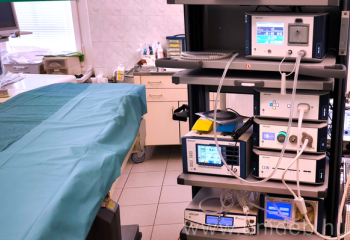
Paediatric surgery can be performed faster and safer at the University of Debrecen's Department of Paediatrics due to a newly installed 3D imaging laparoscopic tower. The device, worth over 40 million HUF, was purchased with the collaboration of the clinic's foundations and significant donations by several companies.
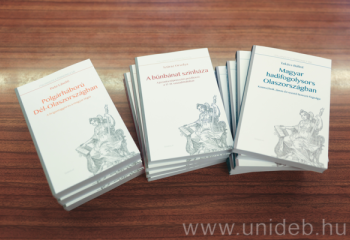
Several new volumes have been added to the Italianistica Pannonica series of the Italian Studies Department of the Faculty of Humanities (FoH) of the University of Debrecen (UD). These three publications, which discuss common Italian-Hungarian historical events, were presented to the members of a select audience on Thursday at the Library of the Hungarian Institute of Literature and Cultural Studies.
